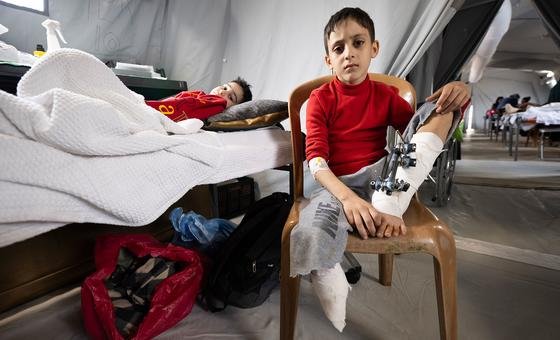Injured during the violent conflict in Gaza, these people suffer from disabilities, brain and spinal cord injuries, severe burns and other problems.
Following a Hamas terrorist attack in southern Israel on 7 October 2023, the Israeli military launched a large-scale offensive in Gaza, killing thousands of Palestinians.
Dr. Richard Peppercorn, the UN agency’s representative in the Occupied Palestinian Territory, said the increased need for resettlement comes at a time when critical health care infrastructure in Gaza is under threat.
According to him, patients are not getting the care they need, rehabilitation services already available are disrupted and there is no specialized treatment for complex injuries.
In view of this, immediate, long-term availability of these services must be ensured to meet the huge rehabilitation needs.
WHO states that other health services including wound dressing, therapy, psychosocial support are either inaccessible or not available at all. This has increased the risk of thousands of people suffering further complications, becoming disabled or dying.
Impact on health services
According to the United Nations Health Organization, only 17 of the 36 hospitals in the Gaza Strip are partially functioning. Primary health care and community-level services are often suspended due to insecurity, attacks or evacuation orders.
Ongoing fighting between Israel and Hamas has resulted in a shortage of trained physiotherapists, further hampering rehabilitation efforts.
According to the United Nations Health Organization, Estimating Trauma Rehabilitation Needs in Gaza Using Emergency Medical Team Injury Datawhich is based on data till 23 July.
In addition to the recently injured Palestinians, thousands of people suffer from long-term illnesses or health problems and lack of access to essential health services will put them at increased risk.
In view of this, the World Health Organization has emphasized on providing safe access to all essential health services, so as to avoid further suffering. There is also provision for rehabilitation of victims.
WHO reiterated its call for the immediate implementation of a ceasefire and the re-establishment of health systems to advance humanitarian assistance efforts to protect civilian lives.
Economic disaster
The current violent conflict has also had a profound impact on the economy of the Gaza Strip. The UN Conference on Trade and Development (UNCTAD) said in a report published on Thursday that Gaza’s gross domestic product has fallen by 81 percent, which could plunge the region into an unprecedented economic crisis.
The poverty situation has worsened due to large-scale job losses and rising unemployment, leaving large numbers of households dependent on humanitarian assistance.
According to UNCTAD, the economy of the West Bank has also been affected by violence, building destruction, expropriation and settlement expansion.
The UN agency has warned that the Palestinian government’s financial stability is under severe pressure, affecting its ability to function effectively and provide vital services.
The report calls on the international community to take immediate action to stabilize the economy, rebuild infrastructure and support long-term peace efforts in the region.

